|
De Amerikaanse dichteres Marianne Moore werd geboren op 15 november 1887 in Kirkwood, Missouri. Zie ook mijn blog van 15 november 2008 en ook mijn blog van 15 november 2009 en ook mijn blog van 15 november 2010.
xml:namespace prefix = o ns = "urn:schemas-microsoft-com:office:office" />
Roses Only
You do not seem to realize that beauty is a liability rather
than
an asset - that in view of the fact that spirit creates form
we are justified in supposing
that you must have brains. For you, a symbol of the
unit, stiff and sharp,
conscious of surpassing by dint of native superiority and
liking for everything
self-dependent, anything an
ambitious civilization might produce: for you, unaided, to
attempt through sheer
reserve, to confuse presumptions resulting from
observation, is idle. You cannot make us
think you a delightful happen-so. But rose, if you are
brilliant, it
is not because your petals are the without-which-nothing
of pre-eminence. Would you not, minus
thorns, be a what-is-this, a mere
perculiarity? They are not proof against a worm, the
elements, or mildew;
but what about the predatory hand? What is brilliance
without co-ordination? Guarding the
infinitesimal pieces of your mind, compelling audience to
the remark that it is better to be forgotten than to be re-
membered too violently,
your thorns are the best part of you.
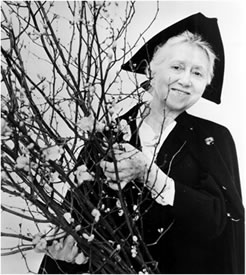
Marianne Moore (15 november 1887 5 februari 1972)
De Poolse dichter en schrijver Antoni Słonimski werd geboren op 15 november 1895 in Warschau. Zie ook mijn blog van 15 november 2009 en ook mijn blog van 15 november 2010.
Uit: On Jewish Sensivity (Vertaald door Mariusz Wesolowski)
One of the cardinal and predominant characteristics of the Jewry is the contempt for the greatest achievements of the human spirit. The Jews disdain everything: they butcher the language they speak, they ignore the purity of speech, body and heart, while attaching an irrational value to money. "An important difference!" - one hears this silly phrase from every other Israelite in the street. To say "Rataj cigarettes" instead of "Seraj cigarettes" is a detail not worth the slightest attention. This disdain for language precipitates the disdain for literature. A realistically thinking merchant says to a non-realistically thinking salesman, "Go read Sienkiewicz!"
A similar attitude is also noticeable in the Polish society, but among the Jews it is significantly more pronounced. I doubt if one can find in any other milieu the type of a poet who does not believe in the existence of poetry and thinks that writing good poems is just a matter of flashy technique and conforming to current fashions. A certain young writer of this kind quite seriously asked me to tell him the secret of creating poems that would be easy to publish and which would be "much talked about later".
The Jewish indifference to physical insults - I have witnessed Jews in coffee shops slapping one another's faces and then resume their business without even getting up - is related to their contempt for physical labour. Hard manual work is good only for the "roughnecks". Physical laborers are almost non-existent among the Jews, because theirs is a non-productive nation, active by and large in commerce and middlemanship. Ninety per cent of the white-slave traffickers are Jewish. In reply to such accusations they typically state that it is the result of the conditions in which they are forced to live. Perhaps the Jews are oppressed and barred from many positions of employment but certainly not to such a degree that they would have to engage in white slavery.
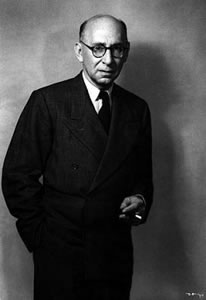
Antoni Słonimski (15 november 1895 4 juli 1976)
De Amerikaanse schrijfster Elizabeth Arthur werd geboren op 15 november 1953 in New York. Zie ook mijn blog van 15 november 2009 en ook mijn blog van 15 november 2010.
Uit: Bring Deeps
I walked, and thought. Tried not to think of Bastian, although I thought of little else. Though I was angry, still, I longed for him, and wanted him beside me as I walked the streets of Kirkwall. I felt defenseless in the face of all these new impressions, which I drew in as if I were a sponge, attached to firth-bound rocks, and water-hungry. On doors and windows, I saw notices of funerals. And not just on the doors of flower shops, or undertakers, but on the windows of the grocers, bakers. On the same windows, there were notices of celebrations, revels; the daily paths of life announced the dying. I longed for Bastian to explain, to point things out, to bring me fully to this place he'd brought me. As he was not there in his body, I tried to think what he might say about these things. I thought of how the people whom Sebastian studied had had no fuels like coal and peat; in that way, too, their time was different. They had no written language, no notices announcing death, and as for fuel, just wood which drifted onto Orkney's shores, or oil derived from whales and seals and fishes. All surface things, however. Nothing to burn which came from down below them.
And what had that been like? To live upon an earth whose skin had never once been torn? Where only shallow plows had tickled it, and little spades had nudged it, to let it take into itself the seed of things to come? The world had been, I thought, quite like an infant child, kept dry by its earth swaddling cloths, and those who'd walked upon it had never dreamed that this would change, any more than they had dreamed that after they were gone there would be written language. Then everything had changed. Then bronze had come, not quite as strong as iron, but still drawn forth out of the body of the earth as copper. And no coincidence, perhaps, that as the bronze had come, the climate changed, and peace and plenty vanished. As people tried to move to better land, the people who lived already on that land built stone towers brochs to stand within and fight, and those stone brochs, signs of the age when neighbor had fought neighbor, still stood in many places in Orkney. All that because of changing winds, and bronze, torn out of secret places in the virgin body of the earth, just like the peat and coal that blew above me.
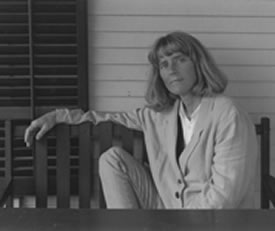
Elizabeth Arthur (New York, 15 november 1953)
De Italiaanse schrijver Carlo Emilio Gadda werd geboren op 15 november 1893 in Milaan. Zie ook mijn blog van 15 november 2008 en ook mijn blog van 15 november 2009 en ook mijn blog van 15 november 2010.
Uit: That Awful Mess on the via Merulana (Vertaald door William Weaver)
The tight garters, curled slightly at the edges, with a clear, lettuce-like curl: the elastic of lilac silk, in that hue that seemed in itself to give off a perfume, to signify at the same time the frail gentleness both of the woman and of her station, the spent elegance of her clothing, of her gestures, the secret manner of her submission, transmuted now into the immobility of an object, or as if of a disfigured dummy. Taut, the stockings, in a blond elegance like a new skin, given to her (above the created warmth) by the fable of our years, the blasphemy of the knitting machines: the stockings sheathed the shape of the legs with their light veil, modeling of the marvelous knees: those legs slightly spread, as if in horrible invitation. Oh! the eyes! where, at whom were they looking? The face! . . . Oh, it was scratched, poor object! Under one eye, on the nose! Oh that face! How weary it was, weary, poor Liliana, that head in the cloud of hair that enfolded it, those strands performing a final work of mercy. Sharpened in its pallor, the face: worn, emaciated by the atrocious suction of Death.
A deep, a terrible red cut opened her throat, fiercely. It had taken half the neck, from the front toward the right, that is, toward her left, the right for those who were looking down: jagged at its two edges, as if by a series of blows, of the blade or point: a horror! You couldn't stand to look at it. From it hung red strands, like thongs, from the black foam of the blood, almost clotted already; a mess! with some little bubbles still in the midst. Curious forms, to the policemen: they seemed holes, to the novice, like red-colored little maccheroni, or pink. "The trachea," murmured Ingravallo, bending down, "the carotid, the jugular! . . . God!"
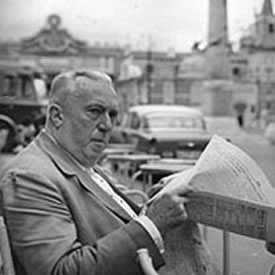
Carlo Emilio Gadda (15 november 1893 21 mei 1973)
De Nederlandse humanistische dichter Janus Secundus (eigenlijk Jan Everaerts) werd geboren in werd geboren in Den Haag op 15 november 1511. Zie ook mijn blog van 15 november 2009 en ook mijn blog van 15 november 2010.
Het II. kvsken
Bij Douza
Mocht ick (o liefsten) eens uw welgedrongen hals
In mijnen armen zulx bestricken,
Oft ghij mij met de uw zo nauw bekruypen, als
Men om den Elst het loof ziet quicken
Des wijngarts, oft de klijf wutwendich om zijn micken
Nieu wegen met zijn telgen sporen,
Zo wild' ick zonder rust, deed kuskens stadich slicken
Oick deur gheen lust van dranck oft koren,
Oft, dat de zoete vaeck ons d'oghen mocht bekoren,
Mij van uw keel niet laten rucken
Och oft mij Venus eens in dezen wou verhoren,
End ons zodaenen bandt mocht lucken,
Bandt, welck noch Hel, noch Doot konst ummer slaen in stucken
Maer kleevend' aen malcander zouwen,
Zulx als wij zyn gemaickt, een ewighe vreucht plucken,
End' onbeschreumt van Charons snauwen
Met d'algemeijne Schuijt ons over laten stauwen
De swarte Phlegetonsche Veeren.
Van waer wij wouden voorts de zalighe Landouwen
Des Elysijnsche Velts passeren.
Aldaer heur' oude liefd noch naer haer doot hanteren
De vorighe Amoreuze Hanßen
Elck met zyn bruijt gepairt; niet doende dan hoveeren,
Met zoenen, zinghen, ende danßen.
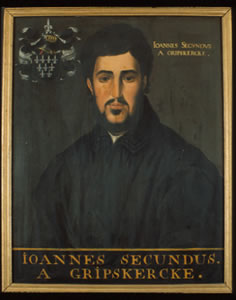
Janus Secundus (15 november 1511 - 1536)
Zie voor onderstaande schrijvers ook mijn blog van 15 november 2010.
De Engelse schrijfster Richmal Crompton Lamburn werd geboren op 15 november 1890 in Lancashire. Zie ook mijn blog van 15 november 2008.
De Duitse schrijfster Emmy von Rhoden (eig. Emilie Auguste Karoline Henriette Friedrich geb. Kühne) werd geboren op 15 november 1829 in Magdeburg. Zie ook mijn blog van 15 november 2009.
De Franse schrijfster Madeleine de Scudéry werd geboren op 15 november 1607 in Le Havre. Zie ook mijn blog van 15 november 2008 en ook mijn blog van 15 november 2009.
De Mexicaanse dichter en schrijver José Joaquín Fernández de Lizardi werd geboren in Mexico-stad op 15 november 1776. Zie ook mijn blog van 15 november 2008.
|



